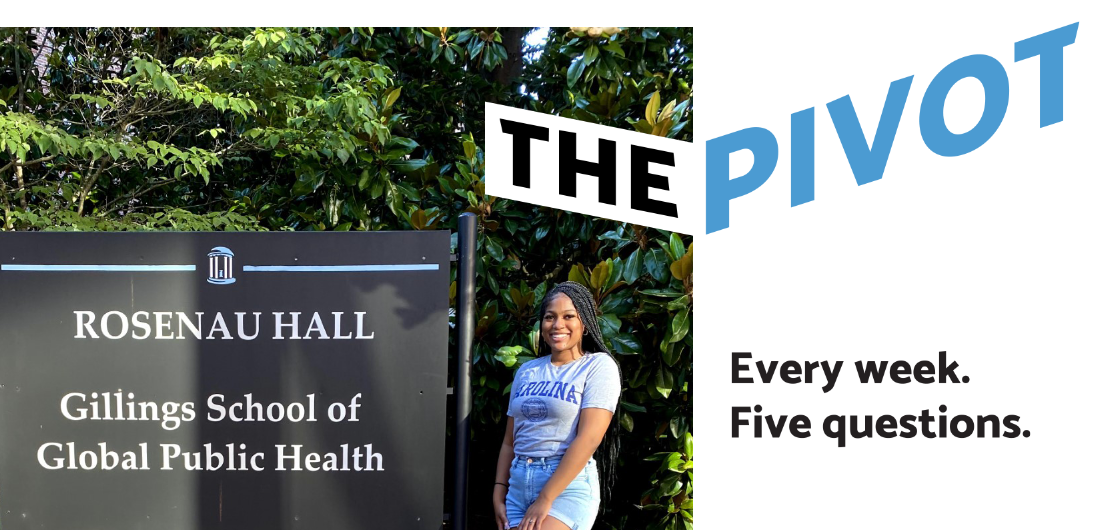Gillings grad Asia Carter connects people to make positive change.

What’s your role in public health?
I just graduated from the Gillings School on May 13! I studied health behavior and, in my second year, served as co-president of the School’s Minority Student Caucus (MSC).
Within the Department of Health Behavior, I worked as a program assistant and supported qualitative, community-engaged research through a community coalition. I was a teaching assistant for two undergraduate classes, both of which centered on health equity and community engagement. I also took a role as a graduate research assistant in UNC’s School of Medicine, where I analyzed interview data for a project that is developing a vaccine for syphilis and wanted to understand how to engage communities in clinical trials.
The highlight of my time at UNC, though, was spent in service of the MSC. Our organization was founded in 1977 and still works to uplift and advocate for all students, bringing to the forefront the concerns of students of color and issues that involve underserved communities.
My first year at Gillings, I was the social chair on the MSC executive board. For two years, I worked to offer professional development events, built community and increase diversity awareness in the School’s admissions process. This organization gave me the chance to sit on the Dean’s Council, talk about the School with admitted students, collaborate with our Alumni Inclusive Excellence Committee and contribute to MSC’s annual signature event: the Minority Health Conference.
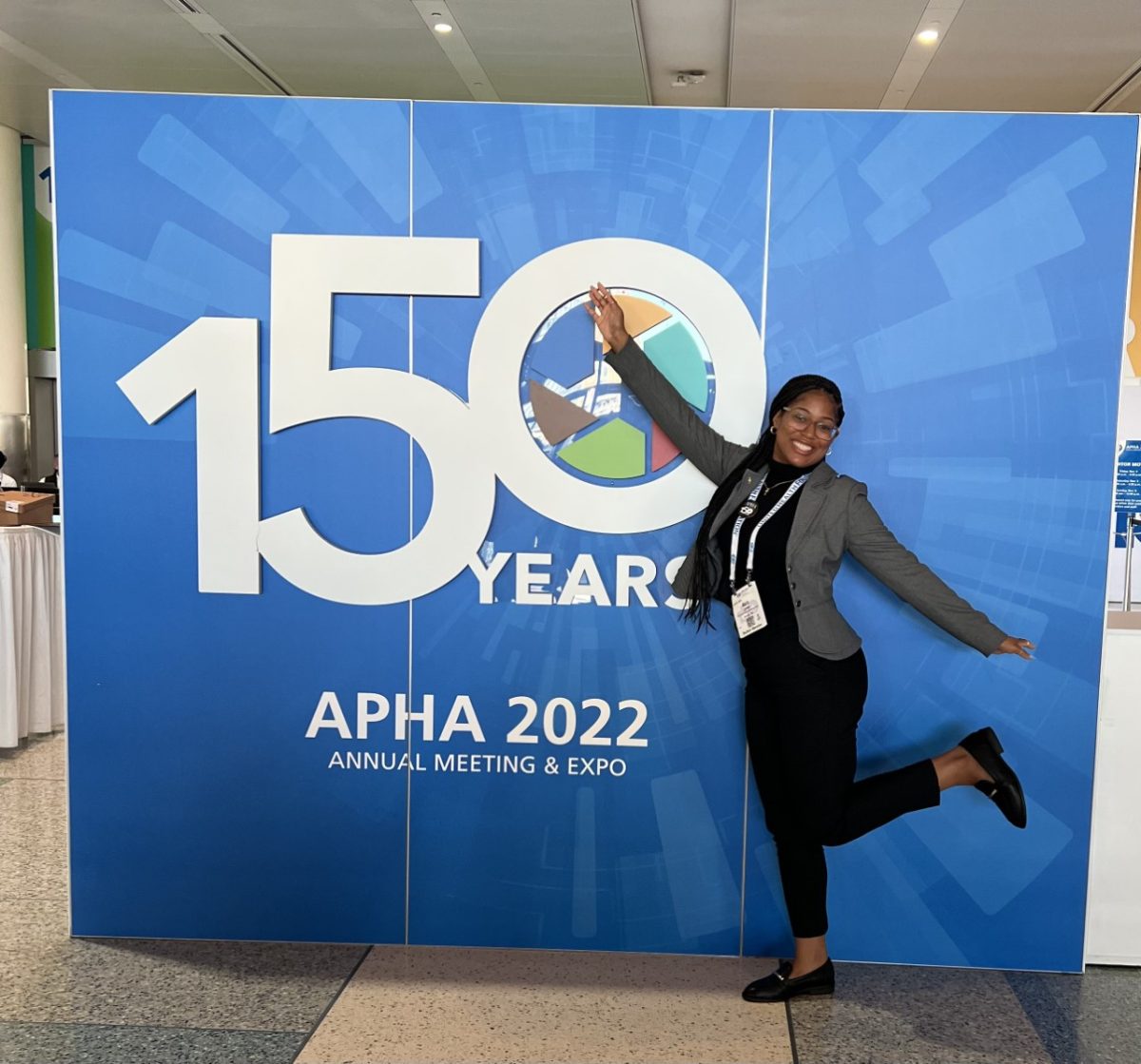
Asia poses at APHA 2022.
I also got to attend the 2022 American Public Health Association annual conference and drop by the alumni reunion, which made me feel so excited to become part of this huge network of phenomenally successful, supportive people.
Gatherings like that make me happy because at heart, I’m a connector. That’s why my work with MSC meant so much to me — I got to put the right people in a room together and facilitate activities that brought people from different backgrounds and concentrations together through their shared interests.

Can you describe your focus area in one sentence?
My passions are social justice and equity.
Before I knew what terms like “health equity” and “social determinants” meant, I was committed to making sure everyone has the opportunity to access what they need to live a good life. I’m really interested in bridging gaps between community members (who have been doing public health work behind the scenes forever) and researchers and public health professionals (who may be better placed to access funding). Together, we can work as members of the same society to eliminate health inequities.
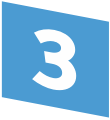
What brought you to public health?
I was previously on the pre-med track. I wanted to be a neurologist, so I took all the natural science classes and was prepared to go directly into medicine after graduating. Then, a course called “Social Determinants of Health and Health Disparities” introduced me to the field of public health, and everything changed. It makes me laugh now that we were required to watch past Minority Health Conference keynote lectures in that class.
On top of that experience, I got to be part of the 2019 cohort of the Summer Public Health Scholars Program at Columbia. Those ten weeks exposed me to graduate level courses and a very unglamorous field placement with the New York City Housing Authority’s “Mold Busters” project.
Even though it was no fun doing inspections of bad cases of mold, it offered me a hands-on introduction to community engagement. This was boots on the ground stuff; this was the real work. I got to see exactly how communities are affected by poor health conditions: If a child contracts asthma from breathing in mold and the family doesn’t have health insurance, the bills start to pile up. Add on that the child may have to stay home sick from school, meaning a parent can’t work, and you get a terrible domino effect.
Once I was exposed to the idea that housing — and so much more — were part of public health, I realized I would make a greater impact doing this work than being in a doctor’s office or hospital.
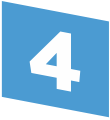
Can you describe a time when you have pivoted in your public health career?
Before starting grad school, I worked as a field organizer with Planned Parenthood. I first got involved as an intern and was able to experience grassroots community organizing and patient advocacy in-person. When the opportunity came up for me to be a full-time organizer, it was 2020 and the pandemic had arrived. I had to transition to all-digital organizing, which was a hugely different way of interacting with the community. I was serving North Carolina’s Triad area up to Asheville and it was a real challenge to be effective in communities where I didn’t live and couldn’t physically visit.
My pivot was becoming more adaptable, learning how to host educational events (for example, about HIV and stigma) on Instagram Live, and generally getting creative with how to spread the word about public health. That’s stayed with me, and I believe there’s a deep need to enhance the focus on quality public health communications. A lot of our researchers don’t know how to share their findings beyond academic journals and conferences, and a lot of our practitioners have no training in how to reach the public where they are these days.
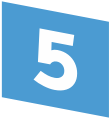
Who are you when you’re at home?
I really enjoy traveling and seeing the world, and I have my parents to thank for the early exposure and passion for traveling. I’ve been to a lot of the Caribbean islands. I remember that I did my online orientation for grad school from Jamaica!
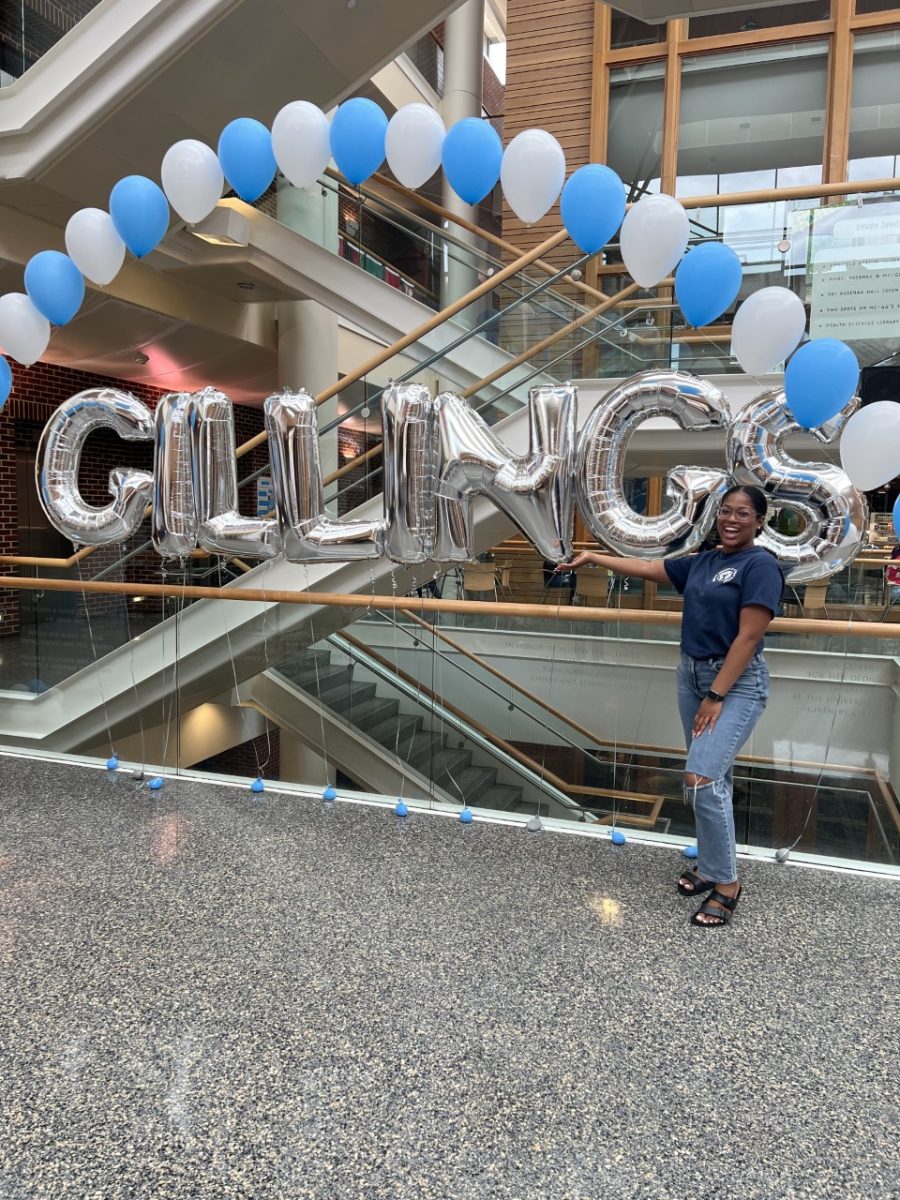
Asia shows off balloons for a student event.
During the pandemic, I started to play piano again. I also doubled down on my love of photography, buying my first DSLR camera and becoming a photobooth owner.
Bonus question: What does the future look like for you?
May 19 is my birthday, so I’m heading to Curaçao.
After that, I’ll be looking for a role where I can use my position to create space for community members to speak and be heard. My LinkedIn profile says that I’m a “champion,” and I believe that. I am a change agent for health equity, and whatever the specifics of a given job are, I’m always going to bring the lens I have forged from my unique life experiences, lessons shared by my classmates and mentors at Gillings, and the theories and realities of racial justice.
I will carry that lens with me in all my work, because we live in a society and world where the perspectives of underserved communities are not always valued but are always needed.
Read more interviews in The Pivot series.
Published: 05/08/2023

